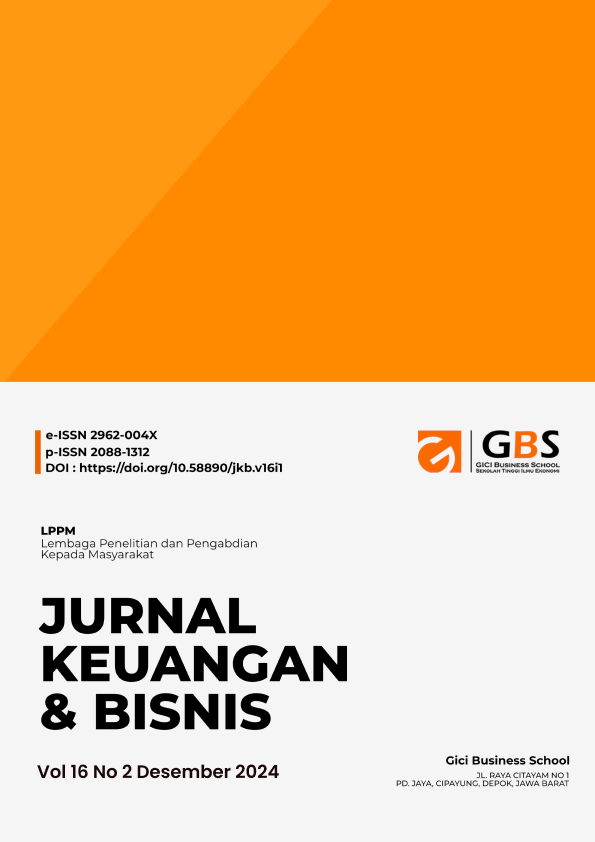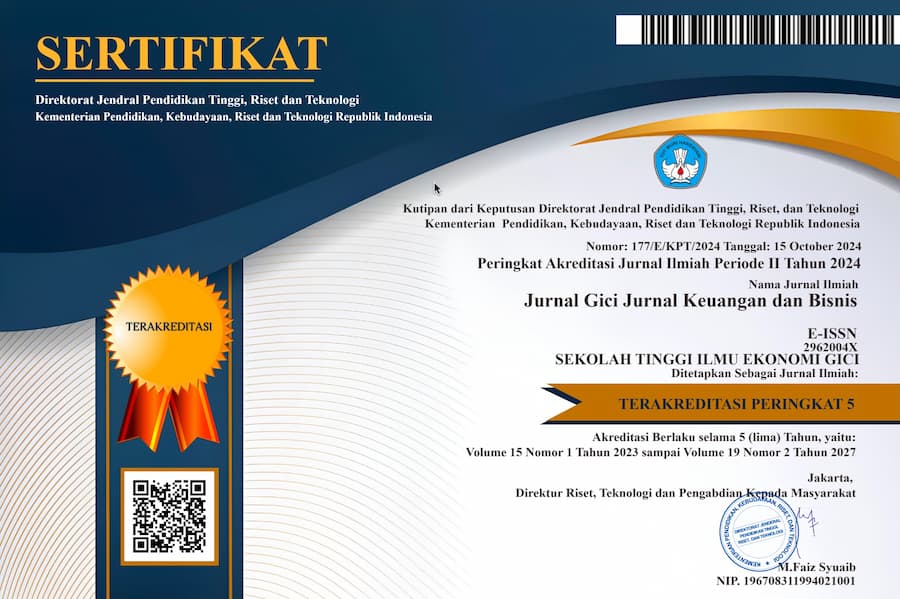PENGARUH KECERDASAN BUATAN UNTUK AUDIT KEUANGAN: MENINGKATKAN EFISIENSI DAN MENGHADAPI TANTANGAN DI ERA DIGITAL
DOI:
https://doi.org/10.58890/jkb.v16i2.309Keywords:
Kecerdasan Buatan (AI); Audit Keuangan; Metodologi Audit; Efisiensi dan Akurasi; Pengembangan Profesional.Abstract
Abstract:
The digital age brings a surge of complex financial data, challenging traditional auditing methods. Artificial Intelligence (AI) comes as a solution, offering increased efficiency and effectiveness of financial audits. This research explores the challenges and opportunities that arise from the integration of AI in the financial audit process. Key issues discussed include the adaptation of traditional audit methodologies to AI, the reliability of AI-guided analysis, and the ethical implications of automation in decision making as well as how AI is revolutionizing the audit process, from automation of routine tasks, identification of patterns and anomalies, to predictive analysis for risk assessment, AI has great potential to improve financial auditing in the digital age. With responsible and ethical application, AI can assist auditors in providing better assurance and increasing public confidence in financial integrity. The research aims to understand how AI affects audit efficiency and accuracy. Using a mixed methods approach, combining quantitative data analysis and qualitative case studies, the research investigated auditors' and organizations' experiences in implementing AI tools. Findings highlight the changing role of auditors in utilizing AI, emphasizing the need for continuous professional development. This research provides valuable insights in the ongoing discourse on the transformative effects of AI in financial auditing.
Keywords: Artificial Intelligence (AI); Financial Audit; Audit Methodology; Efficiency and Accuracy; Professional Development.
Downloads
References
Fang, Q., Yu, N., & Xu, H. (2023). Governance effects of digital transformation: from the perspective of accounting quality. China Journal of Accounting Studies, 11(1), 77–107. https://doi.org/10.1080/21697213.2023.2148944
Fedyk, A., Hodson, J., Khimich, N., & Fedyk, T. (2022). Is artificial intelligence improving the audit process? Review of Accounting Studies, 27(3), 938–985. https://doi.org/10.1007/S11142-022-09697-X/TABLES/11
Fitroh, N., & Syakarna, R. (2023). Peran Teknologi Disruptif dalam Transformasi Perbankan dan Keuangan Islam di Indonesia. Musyarakah: Journal of Sharia Economic (MJSE), 12(1), 76–90. https://doi.org/10.24269/MJSE.V12I1.7486
Iswahyudi, I., Hindarto, D., & Indrajit, R. E. (2023). Digital Transformation in University: Enterprise Architecture and Blockchain Technology. Sinkron : Jurnal Dan Penelitian Teknik Informatika, 7(4), 2501–2512. https://doi.org/10.33395/SINKRON.V8I4.12977
Joshi, A., Benitez, J., Huygh, T., Ruiz, L., & De Haes, S. (2022). Impact of IT governance process capability on business performance: Theory and empirical evidence. Decision Support Systems, 153, 113668. https://doi.org/10.1016/J.DSS.2021.113668
Kirdasinova, K., Omarbekova, N., Tolysbaev, B., Utegenova, Z., & Ashimova, I. (2022). Digital transformation of banking services: development scenarios and management mechanisms. Eastern-European Journal of Enterprise Technologies, 6(13(120)), 107–113. https://doi.org/10.15587/1729-4061.2022.266542
Korol, V., Dmytryk, O., Karpenko, O., Riadinska, V., Basiuk, O., Kobylnik, D., Moroz, V., Safronova, O., Alisov, E., & Mishchenko, T. (2022). Elaboration of recommendations on the development of the state internal audit system when applying the digital technologies. Eastern-European Journal of Enterprise Technologies, 1(13–115), 39–48. https://doi.org/10.15587/1729-4061.2022.252424
Maufik, Janwanti, I., & Aguspriyani, Y. (2024). Manfaat Teknologi Kecerdasan Buatan (AI) Dalam Proses Audit Keuangan. IJM: Indonesian Journal of Multidisciplinary, 2(1). https://doi.org/10.54066/JRIME-ITB.V1I3.461
Neves, Â., & Araújo, V. (2023). Smart Automation for Enhancing Cybersecurity Ângelo Neves Virgínia Araújo. https://doi.org/10.17323/2500-2597.2023.1.89.97
Sherif, K., & Mohsin, H. (2021). The effect of emergent technologies on accountant`s ethical blindness. International Journal of Digital Accounting Research, 21, 61–94. https://doi.org/10.4192/1577-8517-V21_3
Siladjaja, M., Anwar, Y., & Djan, I. (2022). ACRN Journal of Finance and Risk Perspectives The Impact of Real Manipulation and Tax Management on Future Market Value: An Artificial Intelligence Simulation of High Earnings Quality. ACRN Journal of Finance and Risk Perspectives, 11, 33–54. https://doi.org/10.35944/jofrp.2022.11.1.003
Wang, X., Bu, L., & Peng, X. (2021). Internet of things adoption, earnings management, and resource allocation efficiency. China Journal of Accounting Studies, 9(3), 333–359. https://doi.org/10.1080/21697213.2021.2009180
Zhang, Y., & Guo, X. (2022). Digital Transformation of Enterprises and the Governance of Executive Corruption: Empirical Evidence Based on Text Analysis. Https://Services.Igi-Global.Com/Resolvedoi/Resolve.Aspx?Doi=10.4018/JGIM.315128, 30(11), 1–18. https://doi.org/10.4018/JGIM.315128














